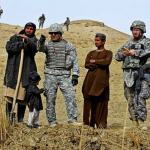By Sarah-Claire Jordan
 Military and civilian linguist regulations have been updated recently by the U.S. Army, and the changes have already gone into effect. This is huge news, as foreign language proficiency is something that the military doesn’t emphasize enough in many people’s opinions. Given that sometimes the only contact someone from another country has with the U.S. is through the soldiers stationed in their town or city, it would be best to make sure those in foreign soil have a reasonable level of proficiency in the language spoken there.
Military and civilian linguist regulations have been updated recently by the U.S. Army, and the changes have already gone into effect. This is huge news, as foreign language proficiency is something that the military doesn’t emphasize enough in many people’s opinions. Given that sometimes the only contact someone from another country has with the U.S. is through the soldiers stationed in their town or city, it would be best to make sure those in foreign soil have a reasonable level of proficiency in the language spoken there.
The regulations that have been updated largely relate to who gets compensated for their foreign/defense language proficiency. The simple answer? Now, those who actually have proficiency are the ones who will be paid extra for this, and those who repeatedly fail proficiency tests will have to suffer the consequences of being passed up for promotions as well as missing out on things like school attendance and re-enlistment.
Besides boosting the probability that soldiers will be able to communicate with civilians on foreign soil, having a decent level of foreign language proficiency helps immensely with operations carried out in conjunction with troops from other countries. If you are a soldier and have to team up with some Afghani soldiers to save some civilians from harm, it is more likely that things will go off without a hitch if the two parties can understand each other. It wouldn’t be the time or place to get upset that not everyone is proficient in English; the best solution is a compromise of both parties having some proficiency in each other’s languages.
Another part of the update includes more support for English-language training for soldiers who are native or heritage speakers of a language other than English and may need some extra help with English. This is extremely important as well, as it means that any prospective soldiers will get the support they need regardless of their level of English. It may be the U.S. Army, but let’s not forget the U.S. is home to speakers of many languages besides English. This regulation change will hopefully make this branch of the U.S. military more inclusive for non-native English speakers.
One of the most important changes that is now in effect is that soldiers can now be flagged if they don’t get the minimum score on the DLPT (Defense Language Proficiency Test). This usually is administered after remedial training, and with the new flagging policy soldiers who do not pass will not be able to be promoted, among other things. This same provision also states that, when a soldier fails this test, the commander must mark them as not qualified in a military occupational speciality.
Hopefully all of these changes will make the U.S. Army more linguistically advanced and more focused on foreign language proficiency. Communication is a huge part of the military, and being able to communicate effectively with foreign militaries and civilians will make military issues much easier to handle. It could even mean avoiding some conflicts altogether.
For an overview of our translation expertise, visit our telephone interpreting service page



